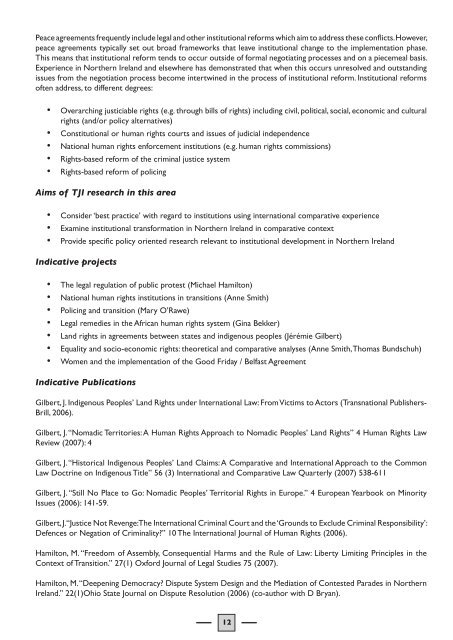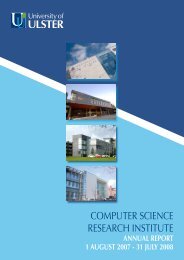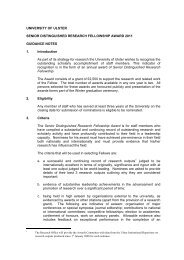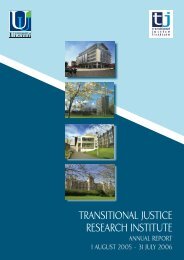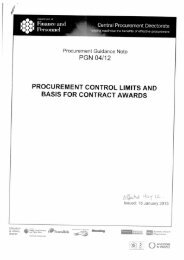Peace agreements frequently include legal and other institutional reforms which aim to address these conflicts. However,peace agreements typically set out broad frameworks that leave institutional change to the implementation phase.This means that institutional reform tends to occur outside <strong>of</strong> formal negotiating processes and on a piecemeal basis.Experience in Northern Ireland and elsewhere has demonstrated that when this occurs unresolved and outstandingissues from the negotiation process become intertwined in the process <strong>of</strong> institutional reform. Institutional reforms<strong>of</strong>ten address, to different degrees:• Overarching justiciable rights (e.g. through bills <strong>of</strong> rights) including civil, political, social, economic and culturalrights (and/or policy alternatives)• Constitutional or human rights courts and issues <strong>of</strong> judicial independence• National human rights enforcement institutions (e.g. human rights commissions)• Rights-based reform <strong>of</strong> the criminal justice system• Rights-based reform <strong>of</strong> policingAims <strong>of</strong> TJI research in this area• Consider ‘best practice’ with regard to institutions using international comparative experience• Examine institutional transformation in Northern Ireland in comparative context• Provide specific policy oriented research relevant to institutional development in Northern IrelandIndicative projects• The legal regulation <strong>of</strong> public protest (Michael Hamilton)• National human rights institutions in transitions (Anne Smith)• Policing and transition (Mary O’Rawe)• Legal remedies in the African human rights system (Gina Bekker)• Land rights in agreements between states and indigenous peoples (Jérémie Gilbert)• Equality and socio-economic rights: theoretical and comparative analyses (Anne Smith, Thomas Bundschuh)• Women and the implementation <strong>of</strong> the Good Friday / Belfast AgreementIndicative PublicationsGilbert, J. Indigenous Peoples’ Land Rights under International Law: From Victims to Actors (Transnational Publishers-Brill, 2006).Gilbert, J. “Nomadic Territories: A Human Rights Approach to Nomadic Peoples’ Land Rights” 4 Human Rights LawReview (2007): 4Gilbert, J. “Historical Indigenous Peoples’ Land Claims: A Comparative and International Approach to the CommonLaw Doctrine on Indigenous Title” 56 (3) International and Comparative Law Quarterly (2007) 538-611Gilbert, J. “Still No Place to Go: Nomadic Peoples’ Territorial Rights in Europe.” 4 European Yearbook on MinorityIssues (2006): 141-59.Gilbert, J. “Justice Not Revenge: The International Criminal Court and the ‘Grounds to Exclude Criminal Responsibility’:Defences or Negation <strong>of</strong> Criminality?” 10 The International Journal <strong>of</strong> Human Rights (2006).Hamilton, M. “Freedom <strong>of</strong> Assembly, Consequential Harms and the Rule <strong>of</strong> Law: Liberty Limiting Principles in theContext <strong>of</strong> Transition.” 27(1) Oxford Journal <strong>of</strong> Legal Studies 75 (2007).Hamilton, M. “Deepening Democracy? Dispute System Design and the Mediation <strong>of</strong> Contested Parades in NorthernIreland.” 22(1)Ohio State Journal on Dispute Resolution (2006) (co-author with D Bryan).12
Hamilton, M. “Strategic Review <strong>of</strong> Parading: Views <strong>of</strong> Key Stakeholders”. Belfast: SRPB, 2008O’Rawe, M. “Human Rights and Police Training in Transitional Societies: Exporting the Lessons from Northern Ireland.”27(3) Human Rights Quarterly (2005).O’Rawe, M. “Transitional Policing Arrangements in Northern Ireland: The Can’t and Won’t <strong>of</strong> the Change Dialectic.”26(4) Fordham International Law Journal (2003): 1015-73.O’Rawe, M. “International Lessons for the Transformation <strong>of</strong> Policing in Northern Ireland.” 2(4) International Journal<strong>of</strong> Human Rights (1998): 66-86 (co-author).Smith, A. “Constitutionalising Equality: The South African Experience” International Journal <strong>of</strong> Discrimination and theLaw (2008) (forthcoming)Smith, A. “Bills <strong>of</strong> Rights as Process: The Canadian Experience” International Journal <strong>of</strong> Law in Context (2008):343Smith, A. “The Unique Position <strong>of</strong> National Human Rights Institutions: A Mixed Blessing?” Human Rights Quarterly(2006).Smith, A. “The Drafting Process <strong>of</strong> a Bill <strong>of</strong> Rights for Northern Ireland.” Public Law (2004): 526.4.4 Dealing with the PastSuccessful transitions in recent years have almost invariably been characterized by attempts to engage with thepast. Conversely, experience warns that failure to address the past adequately may hinder prospects for a successfultransition. Dealing with the past may be viewed as comprising two aspects: (1) Undoing the Past, typically by attemptingto ‘undo’ the displacement <strong>of</strong> people and dispossession <strong>of</strong> land which occurred before and during the conflict; and (2)Accounting for the Past, for instance through the use <strong>of</strong> truth commissions and domestic or international courts andtribunals.Attempts at devising legal mechanisms for dealing with the past challenge accepted notions <strong>of</strong> the role <strong>of</strong> prosecution,trial and punishment. International law increasingly articulates a seemingly inflexible demand for trials for thoseresponsible for major violations. Yet paradoxically, peace-making, reconciliation and truth-telling may be facilitatedby a measure <strong>of</strong> immunity from prosecution, and prisoner-releases have been a feature <strong>of</strong> most conflict-resolutionprocesses. Truth commissions, with their novel approaches to accountability, may <strong>of</strong>fer a way to square this circle,even if a degree <strong>of</strong> conflict with legal norms is involved. Yet such mechanisms cannot be said to represent an escapefrom law, since successful truth commissions almost invariably require a legal mandate. Others champion individualcriminal trials as routes to truth and reconciliation. Yet others (however critically) point to alternative ‘weeding out’(or lustration) mechanisms, whereby those involved in past violations are prevented by administrative or quasi-judicialmeans from public participation in new institutions.TJI research aims to <strong>of</strong>fer a critique <strong>of</strong> existing mechanisms (both theoretical and practical) with policy suggestionsfor domestic and international audiences. The Institute aims to make a direct contribution to ideas <strong>of</strong> ‘truth-telling’through specific projects that examine the legal framework governing key events in the conflict and the transition inNorthern Ireland. These use socio-legal and archive-based methodologies, and explore the relationship between theconflict and the domestic legal framework that governs it.Aims <strong>of</strong> TJI research in this area• Provide analyses <strong>of</strong> the relevant legal standards• Examine the utility <strong>of</strong> traditional theories <strong>of</strong> prosecution and punishment, such as deterrence, with regard totransitional justice mechanisms• Explore dilemmas <strong>of</strong> how to account for the past in the Northern Ireland context, in light <strong>of</strong> the demands <strong>of</strong>reconciliation and the needs <strong>of</strong> victims, with a focus on examining the appropriateness <strong>of</strong> legal mechanisms fordealing with the legacy <strong>of</strong> violations by state and non-state actors (paramilitary groups)• Draw lessons from the experience <strong>of</strong> Northern Ireland for other transitional situations• Mainstream gender and marginalized perspectives into the assessment <strong>of</strong> truth processes13


